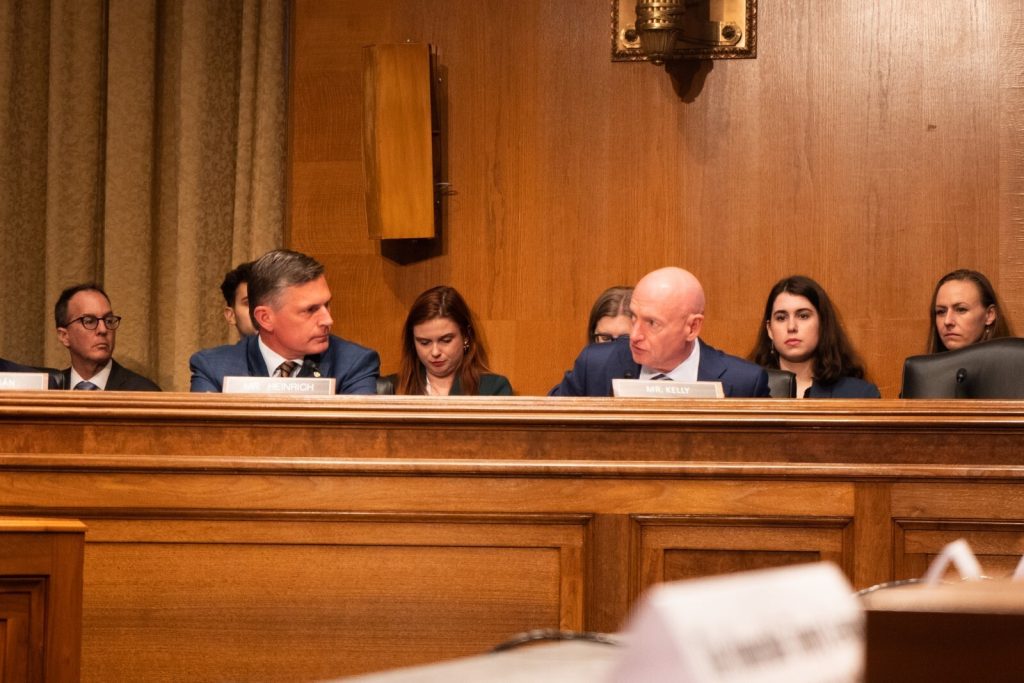WATCH: Kelly Introduces Arizona Tribal Leaders at Senate Committee Hearing on Key Water Rights Bills
Last week, Arizona Senator Mark Kelly appeared before the Senate Committee on Indian Affairs to introduce Navajo Nation President Buu Nygren, Hopi Chairman Timothy Nuvangyaoma, Yavapai-Apache Nation Chairwoman Tanya Lewis, and San Juan Southern Paiute Tribe Vice President Johnny Lehi. These leaders came to testify in support of two critical tribal water settlement bills that Kelly previously introduced to secure long-term water rights and resources for Arizona’s tribal communities.
In July, Kelly introduced the Yavapai-Apache Nation Water Rights Settlement Act—bipartisan legislation to secure a sustainable water supply for the Nation by delivering water from the C.C. Cragin Reservoir, ensuring access to clean drinking water while protecting the Verde Valley’s vital water resources. He also introduced the Northeastern Arizona Indian Water Rights Settlement Act (NAIWRSA) of 2024, which addresses water claims in the Colorado River Basin, providing significant water resources to the Navajo Nation, Hopi Tribe, and San Juan Southern Paiute Tribe. Both bills aim to resolve long-standing water claims, ensure reliable drinking water access, and promote economic opportunities for the tribes. These settlements are the result of years of negotiation between tribal leaders, local stakeholders, and federal agencies.
“These settlements are an enormous step forward for securing your tribes’ water future and providing certainty for Arizona and the whole Colorado River Basin,” said Kelly at the hearing. “Without the settlement, a cloud of uncertainty will remain over tribal water claims, and tens of thousands of tribal members will continue to struggle to meet their basic needs.”

Click here to watch his remarks. See below for a transcript:
Sen. Kelly: Thank you, Mr. Chairman, I would like to thank you and the Vice Chairwoman for including the Northeastern Arizona Indian Water Rights Settlement Act and the Yavapai-Apache Nation Water right Settlement Act in today’s hearing.
It is my honor to introduce Navajo President Buu Nygren, Hopi Chairman Timothy Nuvangyaoma, Yavapai-Apache Nation Chairwoman Tanya Lewis and San Juan Southern Paiute Vice President Johnny Lehi.
President Nygren was elected to serve as the tenth Navajo Nation President in November 2022. President Nygren has a doctorate from the University of Southern California. He has been involved closely with leading the Navajo Nation through the negotiation of the Northeastern Arizona Water Rights Settlement.
Chairman Nuvangyaoma has led the Hopi Council since his election as Chairman in 2018. He has served as a tireless advocate for the Hopi and been instrumental in negotiations that enabled the Northeastern Arizona Water Rights Settlement to come together.
Chairwoman Lewis is an importance voice in the Verde Valley. Before her election as Chairwoman, she served as Vice-Chair and has been on the council since 2010. She has been personally involved in working with parties across the Verde Valley to come to consensus and develop a settlement that is designed for the future.
Vice President Lehi Jr. currently serves as the Vice President of the San Juan Southern Paiute Tribe. He was first elected to the council in May of 2022 and served as President prior to his current role. Vice President Lehi is serving on the council in the footsteps of his father, Johnny Lehi Sr., who served on the tribal council when the tribe was originally recognized in December of 1989.
President Nygren, Chairman Nuvangyaoma and Vice President Lehi I want to commend you for your commitment to your communities. The fact that you have all come together, after decades and multiple attempts at a settlement is truly historic and you and your teams should be recognized for your dedication to this large and complex settlement.
The Northeastern Arizona Indian Water Rights Settlement Act will bring safe and reliable drinking water to your tribal communities in Arizona, establishing a homeland for the San Juan Southern Paiute Tribe. It’s important to note that on the Navajo Nation approximately 30 percent of homes do not have access to safe and reliable drinking water. This settlement is an enormous step forward for securing your tribes’ water future and providing certainty for Arizona and the entire Colorado River Basin. Without the settlement, a cloud of uncertainty will remain over tribal water claims in the Colorado River Basin, and tens of thousands of tribal members will continue to struggle to meet their basic needs.
Chairwoman Lewis, I want to thank you, and everyone who has been a part of the Yavapai-Apache Nation Settlement process for your dedication. The Nation and the parties have worked hard over 15 years to complete the Settlement. Working with the Bureau of Reclamation, the parties evaluated numerous water sources and potential infrastructure options to achieve a reliable and sustainable water supply to meet the Nation’s current and future permanent tribal homeland needs.
Ultimately, the delivery of C.C. Cragin water through the Cragin-Verde Pipeline is the best option. This settlement protects local groundwater aquifers from over-pumping, and thereby preserves these resources that are needed to meet the Nation’s water demands under its settlement budget. By reducing the capture of groundwater that feeds the Verde River, it also protects base-flow that supports the Verde River.
So, this Settlement helps to ensure Arizona’s water future both in the valley and downstream.
I urge my colleagues to support both of these important bills as they move through the Committee process.
Again, Chairman Schatz and Vice Chairman Murkowski, I want to thank you for holding today’s hearing on these two important and historic bills.
